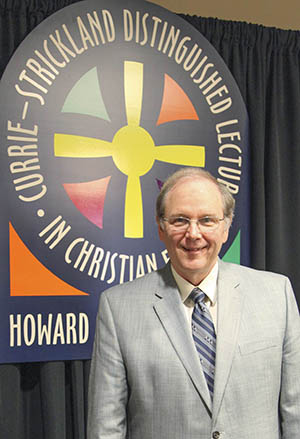Love for neighbor includes people who are different, Sellers insists
BROWNWOOD—The second Great Commandment of Jesus—“love your neighbor as yourself”—requires Christians to show inclusive love to people of different faiths and cultures, a theologian and missions expert told students and guests at Howard Payne University.
 Theologian and missions expert Rob Sellers offered reasons Christians should love people who follow faiths other than their own. (Photo / Amy Pitman)Rob Sellers, professor of theology and Connally Chair of Missions at Hardin-Simmons University’s Logsdon Seminary, delivered the Currie-Strickland Distinguished Lectures in Christian Ethics at Howard Payne University.
Theologian and missions expert Rob Sellers offered reasons Christians should love people who follow faiths other than their own. (Photo / Amy Pitman)Rob Sellers, professor of theology and Connally Chair of Missions at Hardin-Simmons University’s Logsdon Seminary, delivered the Currie-Strickland Distinguished Lectures in Christian Ethics at Howard Payne University.
Reasons to love
Sellers offered six reasons Christ’s followers should love people who follow faiths other than their own:
• “The future of peace—locally and globally—depends on it.”
Christians—who are called to be peacemakers—have a responsibility to treat people of other faiths as neighbors, not enemies, Sellers insisted.
“The horrific images from Paris last November are recent illustrations that religious fervor, fueled by political diatribe and lacking any regard for the sanctity of the other, can result in hate speech, violence, terrorism and war,” he said.
“But, of course, it’s not just any one religious group whose failure to act out of love threatens world peace. The presence of extremist factions in all religions is well-known and documented.”
• “All the major world religions teach it.”
All major global religious traditions hold love as a core moral value and central ethical teaching, he noted.
• “Jesus did it.”
When Jesus—“who is our model for what it means to live in a way that pleases God”— interacted with Gentiles and Samaritans, he demonstrated love and acceptance.
“It’s puzzling,” he observed. “We stress the importance of having a personal relationship with Jesus Christ and becoming a new creation. We aspire to make Jesus the Lord of our lives. For many evangelicals, that process has included asking what Jesus would do in given circumstances and imitating him.
“Oddly, however, a lot of these same people of faith and piety rarely ask, ‘What would Jesus do?’ when deciding how to talk about or act toward people who are Muslims, Hindus, Baha’is, Sikhs, Jains, Jews, pagans, indigenous religionists or any other religious group. …
“I don’t know about you, but because imago Christi—the imitation of Christ—is such an important aspect of Christian history, I want to love the Gentiles and Samaritans in my contemporary world, because that is how Jesus acted.”
• “Baptist heroes of the faith have practiced it.”
Sellers pointed to Roger Williams, who founded Rhode Island colony on principles of religious liberty, and John Leland, the Virginia Baptist who persuaded James Madison to secure freedom of religion in the Bill of Rights.
He cited Lottie Moon, the pioneering missionary who starved herself to death by giving her food and money to her Confucian, Taoist and Buddhist neighbors in China. He highlighted Howard Thurman, the Baptist minister whose meeting with Mahatma Gandhi in India inspired him to found The Church for the Fellowship of All People in San Francisco, and Martin Luther King Jr., who championed nonviolent resistance to achieve civil rights.
He also pointed to Bill Koehn, Kathleen Gariety and Martha Myers—Southern Baptist missionaries who were killed by a radical gunman who entered Jibla Baptist Hospital in Yemen, where they served.
“Despite the hassles, and sometimes even the dangers, we must love our neighbors who walk other spiritual paths,” Sellers said. “Our Baptist heroes did it. We should, also. But it won’t always be an easy thing to do.”
• “We are enriched in our own Christian faith by experiencing it.”
When Christians show inclusive love to people who follow other faiths, they learn valuable lessons that strengthen their own walk with God, he said.
• “We connect more with God by doing it.”
Christians “connect more directly with the God of love and the Christ of compassion” when they show love to neighbors who do not share their faith, he insisted.
“We love indiscriminately, because that’s when we really get to know God best,” he said.
Love the ‘alien’ and ‘stranger’
In particular, love for one’s neighbor requires Christians to show love to people the Bible identifies as the “alien” or “stranger,” Sellers said. In 21st century Texas, that specifically means Mexican immigrants and Muslims, particularly those of Arab origin, he noted.
“What does it mean not to ignore the person in need, not to oppress the foreigner or the poor?” he asked. “What does it mean to care for the alien and the stranger? What does it mean to live out the gospel?”
Sellers challenged Christians to “look for Christ in the face of the foreigner, the sojourner, the alien and the stranger.”
Begin by connecting the stories of immigrants with the biblical story, and recognize God’s love for all people, he urged.
“Christians need to relate the insight of John 3:16—that God loves the world, the whole world—to how God, through the prophetic voices of Old Testament Scripture, calls upon us to care for the religious other,” he said.
He warned against approaching people of different faiths and cultures from a position of triumphalism—assuming Western Christians possess all the answers and others have none.
Instead, he encouraged Christians to follow the “self-emptying” example of Christ by taking on the role of servant and student, learning from others and offering hospitality to the alien and stranger.